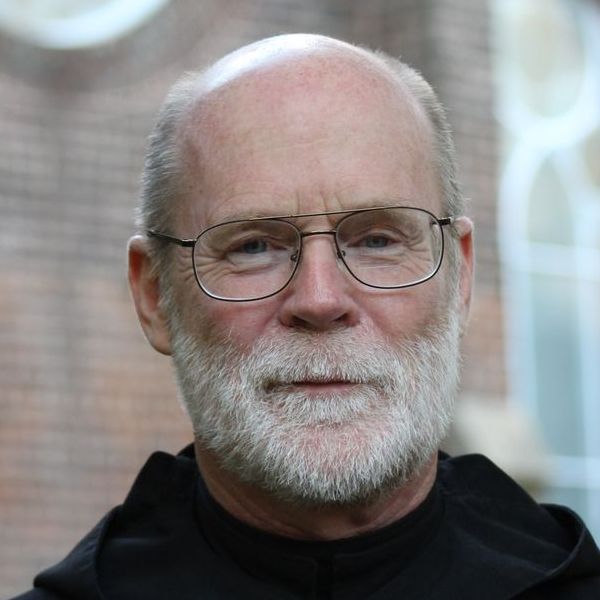Whether you have questions about discernment and vocations or want general information about Belmont Abbey, we invite you to reach out and ask!
Homilies

September 9, 2019
23rd Sunday of Ordinary Time, September 8, 2019

The Gospel today seems harsh, does it not? Jesus has just told us If anyone comes to me without hating his father and mother, wife and children, brothers and sisters, and even his own life, he cannot be my disciple. What is this!? Obviously, the same Lord who commanded us to honor our father and mother and to love others as we love ourselves cannot mean this literally. So what does he mean? I think he wants to get our attention regarding the gravity of the choice to be his disciple. Phrasing it this way is certainly an effective way of doing that. If his unsettling choice of words such as “hating” were not enough to get our attention, he follows them up with the unconditional demand: Whoever does not carry his own cross and come after me cannot be my disciple. Do we take these words seriously? Does the Lordship of Jesus Christ give form and relative value to every other value and relationship in my life? Or is it simply one value or choice among many that I feel I have to weigh against other competing values?
Our second reading today presents the choice clearly if we read the entire the letter in its entirety. The Letter to Philemon by St. Paul is one of the shortest of the letters of the New Testament; not even a page long. It is short but powerful, and I commend it to your reading. The sentiments we have heard today from this letter are beautiful. But the letter in its entirety is dynamite, because it blows apart any idea that commitment to Jesus and his Gospel will be either simple or easy.
Paul evidently brought Philemon, to whom he is writing the letter, to the Christian faith. Thus he is writing him with all the authority of an apostle and teacher. He makes his request all the stronger by telling Philemon that he, Paul, is now an old man and is in prison. He is writing Philemon about Onesimus, who is Philemon’s runaway slave, who has been captured and is in prison awaiting to be sent back to his master. It appears from the letter that Onesimus not only ran way, but also stole Philemon’s property, because Paul promises that he himself will repay the debt. Evidently Paul has baptized Onesimus, while in prison and thus, as he says, has become Onesimus’ “father”, just as he is Philemon’s “father”. Now St. Paul is writing with all the weight he can bring to bear to ask Philemon to receive Onesimus back not as a runaway slave and a thief, but as a beloved brother in Christ. Paul also intimates that he will himself is going to be released and that he intends to visit, so he will soon be there in person to see whether or not Philemon acceded to his request.
Philemon is now faced with a fateful choice which will determine the rest of his life. The normal treatment at the time for a runaway slave was severe punishment and perhaps even bodily mutilation. But if Philemon follows what the culture dictates and punishes Onesimus perhaps by cutting off an ear, he will have to face the Apostle Paul and it will be clear that he really did not believe what Paul preached. On the other hand, if he accepts Onesimus back as a brother in Christ, he will be ostracized by his friends and neighbors, be treated as a social pariah, and possibly face financial ruin as all his slaves seek baptism and the status of brothers in Christ. What should Philemon do?
This is an important question, because we are the Philemons of today, and so the stark message of Jesus’ words ought to get our attention. We took for granted what once was a nominally Christian society, where Christians were general identified with “good people” and often non-Christians with “not quite as good”, even when their moral uprightness far surpassed that of the nominal Christians. Church membership was once considered a necessary accouterment of “respectability”, provided one did not take it too seriously and become “fanatical”. But the culture was only nominally Christian; it was never really converted. And now all that has changed.
St. Paul challenges Philemon with the radical demand we have just heard in today’s gospel. He ask Philemon to break out of the false values imposed by his culture whereby slaves were seen as property, i.e. as things or objects – a view supported by the economic and social privilege produced by a slavery – and live according to the teaching of Jesus. If we think that this is a story of long ago times, let us remember that in our own country once supported the same view of slaves, likewise supported by the culture for the economic benefit and social advantage it provided. It was a view enshrined in the Constitution of the United States, even though it was wicked, false and contrary to the gospel.
And the culture today continues to oppose the gospel for the benefit of the powerful and elite. How often have we witnessed public figures abandon the truths of the gospel for the truths of the culture, fulfilling the words of the Gospel: For they preferred human praise to the glory of God (Jn.12:43). If we think this is not our concern, we are kidding ourselves. Just this past week, suit was brought against a Catholic hospital in Colorado because, in keeping with teaching of the Catholic faith which is the reason the hospital exists, it would not assist a man in taking his own life. Colorado, you see, has legalized assisted suicide. It is not sufficient for the culture that others recognize this choice on the part of some, but everyone must conform and be forced by the coercive power of state to participate in the taking of an innocent life –something which used to be considered murder. But in this as in other instances the Father of Lies subtly changes the words. It is now “euthanasia” i.e. “a good death”, or “mercy killing”, so everyone must affirm it. It is, however, opposed to the gospel of Jesus Christ.
Interestingly enough, also this past week, Pope Francis, addressing a meeting of oncologists, warned against the danger of euthanasia in perverting the very purpose of healthcare. He correctly identified euthanasia as a rejection of the virtue of hope enshrined in a utilitarian understanding of the human person as a thing, an object, which may be expendable; in other words, a new form of slavery. And so we are back to Philemon in our own day and country.
Do we wish to place our hopes in the fickle instability of the culture, which panders to the interests of the rich and powerful, or in faith of the church, founded by Jesus Christ, the Son of God, the Savior of the world? The choice is ours, now and when the Lord comes again.
Abbot Placid Solari, O.S.B.